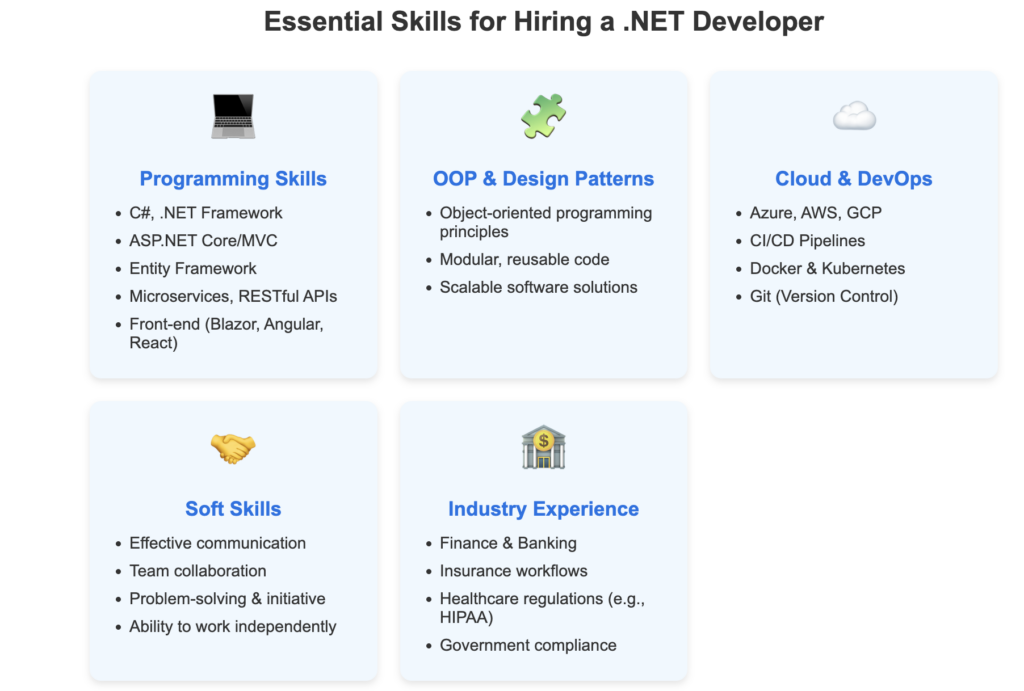Hiring managers in the US currently face strong competition, especially for senior .NET developers, ranked as the #1 most in-demand tech role in 2024—a trend that continues into 2025. A Gartner report noted that 70% of IT leaders are struggling to fill tech roles due to a global talent shortage– experienced dot net specialists are among those hard-to-fill roles.
Besides fierce competition, there are other significant challenges when hiring and keeping talent:
- Inconsistent Skill Sets
The .NET environment is evolving much faster, and many .NET developers need to also learn how to interface with multiple cloud services and DevOps activities, while junior programmers need to learn all the fundamentals. As a hiring manager, you must decide whether you should seek a developer who already possesses every desired skill or should you prioritize adaptable developers who demonstrate an ability to learn new technologies quickly?
- Developers’ high salary expectations
Developers do come at a “high price” and many studies even show constant growth in their salaries. As an example, another Gartner report shows that the average developer salary in the United States by the end of 2024 is $129,000, and because of the constant demand, this salary is expected to grow by 5–7 percent in 2025. This growth is due, at least partially, to the continued demand for developers with unique skills like cloud development and AI.
- Prolonged Hiring Process
The usual recruiting process for skilled positions starts by conducting a range of interviews, including skills interviews, architectural process interviews, social interviews, and more. This can be time-consuming. The risk? Exceptional candidates may accept other offers if your process is too slow.
- Employee retention
After hiring a senior developer, you need to consider the danger of key developers leaving the company, as well as the financial cost of another recruiting process. There will always be another opportunity for a senior developer, and a company needs to keep the developer happy.
As you can see, employers have a long, tough road ahead to finding that ultimate senior, magical unicorn developer. But it can be done, with the right strategy. Let’s start with the skills you need to look for in your next dot net expert:
Key Qualities Required of A Senior dot net Developer

First, let’s start with the hard skills that a dot net developer should have:
Specific Needs: Programming skills
You want your new dev to be highly skilled in C#, the .NET platform, and modern frameworks like ASP.NET Core, ASP.NET MVC, and Entity Framework. Familiarity with microservices, RESTful APIs, and front-end technologies (HTML/CSS/JavaScript), including frameworks like Blazor, Angular, or React, is valuable. Strong knowledge of object-oriented programming and design patterns is essential for building scalable solutions.
You also want to make sure the developers they hire understand OOP design patterns, which are a series of rules and principles for creating modular, flexible, and reusable software solutions.
Cloud services and DevOps
One aspect of the developer industry that has changed in the last few years, and is especially relevant for senior developers, is the need to work with Cloud services.
Senior .NET developers should have strong cloud computing experience, especially with Microsoft Azure, and ideally AWS or GCP. Familiarity with Azure’s hosting services, databases, and serverless computing is key. DevOps proficiency, including version control (Git), CI/CD tools , containerization (Docker), and orchestration (Kubernetes), is now essential. These skills support the growing industry shift toward cloud-native, containerized microservices and rapid deployment cycles.
Soft Skills Requirements
Besides the large requirements of hard skills, you should look for developers that posses important soft skills. Naturally, there will be more emphasis on communication and teamwork skills, and we expect developers to be able to explain complex ideas in non-technical terms and interact with people in different departments. There is also a need to be competent problem solvers. Elements like taking initiative to identify, clarify, and resolve issues in less straightforward situations are considered important. Developers must also be able to work independently to prepare specific work products and satisfy specific work requests.
Industry Experience
Industry-specific expertise can make senior .NET developers especially attractive candidates. Companies in finance, insurance, healthcare, or government often seek developers familiar with their industry’s unique workflows, compliance needs, and data standards (e.g., insurance systems, banking processes, or healthcare regulations like HIPAA).
While not always mandatory, domain knowledge helps senior developers onboard quickly and make better-informed decisions, making it a valuable “preferred” qualification in 2025 job descriptions.
Read on to learn the steps required in the hiring process for .NET developers, the essential skills and technical expertise to focus on, and the interview questions to pose, to ensure you make the right hire.
9 Simple Steps to Hire .Net Developers
The IT recruitment industry is full of sharks ready to attack when they see a talented developer. It might sound like an exaggeration, but hiring developers is getting harder every year, mostly because many of them already have jobs as there is high demand. According to a Stack Overflow Developer Survey (90,000 developers were surveyed), only 6.4% are currently unemployed and looking for a job.
And a survey conducted by Indeed found out that out of 1,000 tech hiring managers and recruiters, 9 out of 10 (86%) said hiring technical talent is challenging, and over a third (36%) said it is very challenging.
We don’t want to scare you, but those are the facts. Fortunately, there are key strategies you can implement to hire a .NET developer successfully:
1. Expedite the hiring process
Shorten the hiring process to avoid losing top .NET candidates. Yes, that’s the first step, to plan ahead and structure the recruitment process to be fast and efficient. Talented developers often have multiple offers, and slow decision-making could cause you to miss out.
Consider consolidating interviews and promptly extending offers to your best candidates. Be transparent about salary ranges and expectations early in the process—this helps align both parties and prevents prolonged negotiations. By acting quickly and clearly communicating at every stage, you’ll demonstrate respect for candidates’ time, increasing your chances of successfully hiring the best .NET developers.
2. Specific Project Requirement Analysis
A nuanced analysis of specific project requirements is crucial before making a hiring decision. This involves a deep dive into the project’s technical demands, such as the necessity for system integration with existing platforms or third-party services, which might include CRM systems or cloud services.
It’s equally important to consider any special security needs, especially if the project deals with sensitive data, requiring compliance with standards like GDPR or HIPAA.
Assess the project’s scale and complexity to understand the level of expertise required from a .NET developer.
3. Have a Clear Job Add
Creating an effective job description is a critical step in attracting the right candidates, especially for a specialized role like a .NET developer.
When crafting your job description, start with a precise job title, like ‘Senior .NET Developer,’ followed by a concise summary that underscores the role’s significance within the company.
Detail the key responsibilities, specifying daily tasks, project types, and collaborative aspects of the role. Clearly articulate the required technical skills, such as expertise in C#, .NET Framework, and Agile methodologies, while also mentioning desirable skills, like familiarity with cloud technologies.
Don’t forget to give a snapshot of your company, highlighting its culture and unique selling points, and be transparent about the compensation and benefits offered. Conclude with a straightforward application process and an equal opportunity statement to reflect your commitment to diversity.
Remember, the essence of a great job description lies in not just listing the requirements, but in effectively marketing the role and your organization to prospective candidates.
4. Embrace Global Candidates
With your job description in hand, the next step is to strategically post your job ad to reach candidates effectively. Aim to place your ad where developers are most engaged and active.
Face the local .NET talent shortages by broadening your search by considering remote and global candidates. Embracing remote hiring within the U.S. lets you access skilled Dot Net developers from other states without requiring relocation, significantly expanding your candidate pool.
Additionally, exploring international talent pools—particularly through nearshoring or offshoring—can help fill roles quickly and cost-effectively. Regions such as Latin America and Eastern Europe have abundant, experienced .NET developers available at competitive rates.
5. Advanced Technical Evaluation
Stay away from generic or repeated tests when evaluating Dot Net developers.
Employ practical coding tests relevant to .NET, such as creating a basic console application, which they should complete in a reasonably short period. This test should be designed to evaluate their coding, and it’s best conducted after you’ve screened out less suitable candidates.
Complement these practical assignments with live coding sessions, reviews of the candidate’s past project codes, and assessments of their theoretical understanding in areas like C#, the .NET framework, and database management. This comprehensive testing strategy ensures you evaluate both their hands-on coding skills and their grasp of essential .NET concepts and practices.
6. Focused Soft Skills Assessment
Assess candidates’ communication skills and their ability to work effectively in a team. Use behavioral interview techniques to gain insights into their professional experiences and how they handle real-world challenges.
What soft skills do you value the most? Figure them out and create questions that can help you identify those skills.
7. In-depth Interviews with a Technical Panel
When hiring senior .NET developers, evaluating their technical abilities and problem-solving skills is key. In the screening process, use a multiple-choice quiz to cover C# syntax, .NET frameworks (like .NET Core and ASP.NET), basic SQL, HTML/CSS/JavaScript basics, SOLID principles, and Git usage. This assesses their knowledge across essential areas. Code reviews and live coding tests can provide a practical assessment of their skills.
Another way to vet them is to assign a homework project where they build a simple CRUD application with .NET Core, and any front-end technology (like Blazor or ASP.NET Razor) to demonstrate their practical skills. Lots of developers would be open to a home assignment instead of pair programming interviews. In the end, choose the method that works best for you and your team, but don’t skip this step.
8. Competitive Market Analysis for .NET Developer Rates
Research current market rates for .NET developers using platforms like Glassdoor and Payscale.
Here’s a detailed approach to ensure you offer a competitive and fair package that aligns with current market trends and your budget:
- Start by researching current market rates – Use platforms like Glassdoor, Payscale, Indeed and others to gather data on salaries.
- Consult recruitment experts – Reach out to recruitment agencies that specialize in tech and development roles, as they can easily provide you insights about the current global market and help you position your offer, finding you the ideal candidate.
- Analyze job postings – Review job positions for developers to see what other companies are offering.
- Consider additional benefits – Developers are not only into high compensation. They are also looking for benefits, including health insurance, retirement plans, flexible hours, remote work, and more.
9. Strategic Onboarding Plan
The final step is onboarding. This is as important as the first step. Onboarding is fundamental not only to help the new developer understand more about the team and its dynamics but also to generate vbvn7uyhtbf engagement from the start. Research shows that great onboarding improves employee retention by up to 82%.
Implement an effective onboarding process to integrate new .NET developers into your team. Include pre-onboarding communication, technology setup, training in your specific .NET implementations, and regular check-ins for support and feedback.
In-house vs. Remote .Net Developers: What’s the Right Choice
As a staffing agency, we understand the complexities of choosing between in-house hiring and remote recruitment agencies such as DistantJob.
The quiz below helps you understand the differences between using DistantJob’s services for hiring remote tech experts and traditional in-house hiring processes and can help you determine which hiring approach best suits their needs.
Which Hiring Approach Is Best for You?
As you can see, we offer several advantages in terms of efficiency, global reach, and specialized support for remote work. In-house hiring may also benefit in terms of direct cultural alignment and familiarity with local practices.
The interview questions to ask when Hiring a .Net developer
By preparing a mix of technical and behavioral questions, you’ll be able to gain a holistic understanding of the candidate’s capabilities and how well they’ll mesh with your team. This comprehensive approach to interviewing will aid in making an informed hiring decision. Let’s start with the:
Technical questions:
1. What is the difference between a while and for loop? Give a .NET syntax for both types
Every developer you are looking to hire should know the difference between a while and for loop as they are very frequently used any time a unit of code must repeatedly be executed. The for loop is used when the number of iterations is known, whereas the while loop should be utilized until a given statement become true.
An example of this syntax in VB.NET is below.
While loop:
While condition [is True]
'statements
End While
for loop:
For counter [As datatype] = start To end [ Step step]
'statements
Next [ counter ]2. Explain what .NET web services are
Almost every single application that your .NET developer codes will need to access the web. .NET web services are “reusable components that allow developers to publish an application’s function over the internet to make it accessible and directly interactable with other applications and objects online.”
Web services use the standard web protocols and data formats, such as HTTP and XML, so they can connect across numerous platforms and languages. With ASP.NET your programmers can develop web services, and the .NET framework has built-in classes that are made to build and consume web services.
3. Explain what a delegate is in .NET
The .NET programmer who you’re interviewing should be able to explain that using a delegate lets the developer encapsulate a reference to a method inside a delegate object, similar to a pointer in C and C++. Then, the delegate object can be given code that can call the reference method without needing to know which method will be invoked at compile time.
Additionally, delegates can be used to create custom events within a class. Here’s an example:
public delegate void FooDelegate ();
class FooClass
{
// custom event
Public event FooDelegate FooEvent;
}
FooClass FooObj = new FooClass ()
FooObj.FooEvent += new FooDelegate ();4. What is the difference between managed and unmanaged code?
The main goal of this question is to understand if your potential .NET developer to hire understands CLR, which is a major portion of the .NET framework. The CLR provides functionalities that are important for development like memory management and garbage collection and runs managed code, like Visual Basic.NET.
Because of this, the manage code is platform-independent because it runs within the CLR instead of the operating system of the machine using the application. Languages like C or C++ produce unmanaged code, so the CLR doesn’t provide this functionality with them. However, unmanaged code is still used in .NET, such as in COM components, ActiveX interfaces, and Win32 API functions.
5. What is Inheritance?
Inheritance is one of the most relevant concepts in OOP, along with encapsulation and polymorphism. Inheritance allows developers to create new classes that reuse, extend and modify the behavior defined in other classes. All this enables code reuse and speeds up development. Developers are able to write and debug one class only once, and then reuse that code as the foundation for the new classes.
6. What is the difference between an abstract class and an interface in .NET?
An abstract class provides a partial implementation for functionality and some abstract/virtual members that have to be implemented by the inheriting entities. It can declare fields as well. The interface, on the other hand, declares a contract or behavior that implementing classes should have.
In other words, an Abstract class allows you to create functionalities that subclasses can also implement. An interface will only allow you to define functionality but not implement it.
Behavioral Questions for. Net Developers
- Describe a time when you had to work closely with a team to complete a project. What was your role, and how did you handle conflicts or disagreements?
- How do you stay updated with the latest advancements in .NET technology?
- Describe a situation where you had to learn a new technology or framework quickly to meet project requirements.
- Share an example of a challenging problem you faced in a previous project and how you resolved it.
- How do you prioritize your tasks when working on multiple projects with tight deadlines?
- Describe a time you received constructive criticism and how you responded to it.
Conclusion
These hiring steps and interview questions will help you ensure that you hire a .NET developer with the right experience and skills.
You can find .NET developers through freelancing platforms, job boards, or by looking through social media platforms. However, this will require you to spend a lot of time trying to find the perfect match.
If you need assistance or prefer to bypass the complexities of the hiring process, don’t hesitate to contact us. We’re here to simplify and streamline your recruitment experience.
At DistantJob, as an IT remote staffing agency, we can help you find a qualified, guaranteed expert without the pain of searching and interviewing to join your team. You tell us what type of candidate you need, and in less than a month, you’ll have a skilled full-time remote .Net developer ready to start working with you. Contact DistantJob today for a free consultation!
.NET is a software development framework and ecosystem that was created and released by Microsoft in 2002 to allow easy desktop and web application engineering. The framework significantly speeds up the development process by offering secure and simple ways to create an application or a website.
NET developers are primarily responsible for designing, implementing, and developing software applications according to the different business needs. They also analyze to identify specific problems to provide and develop the appropriate system requirements.






